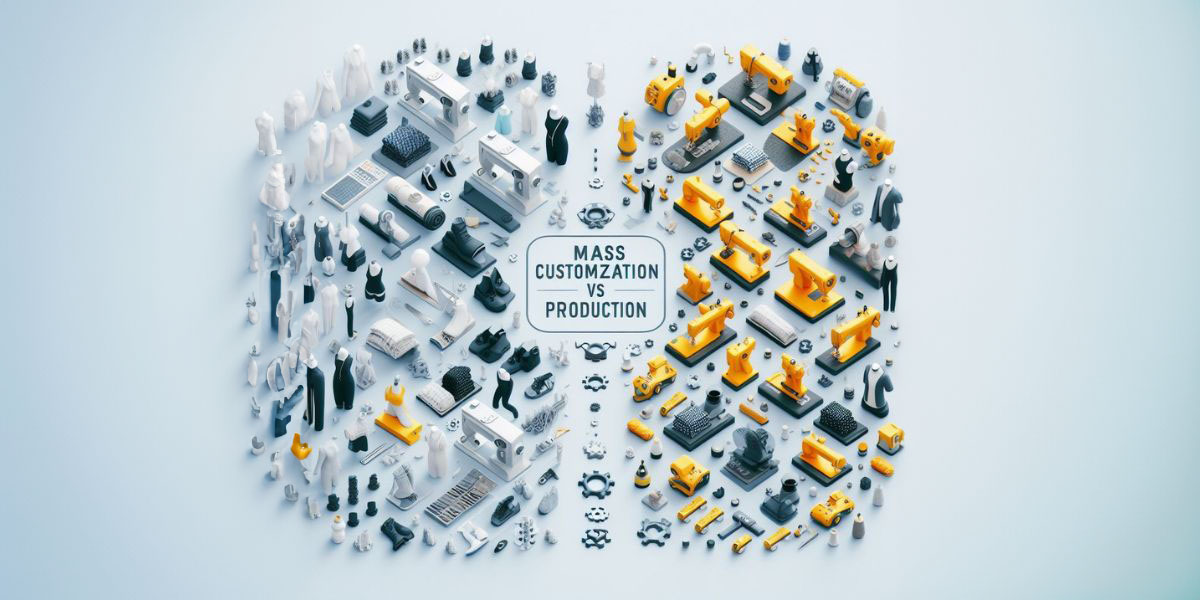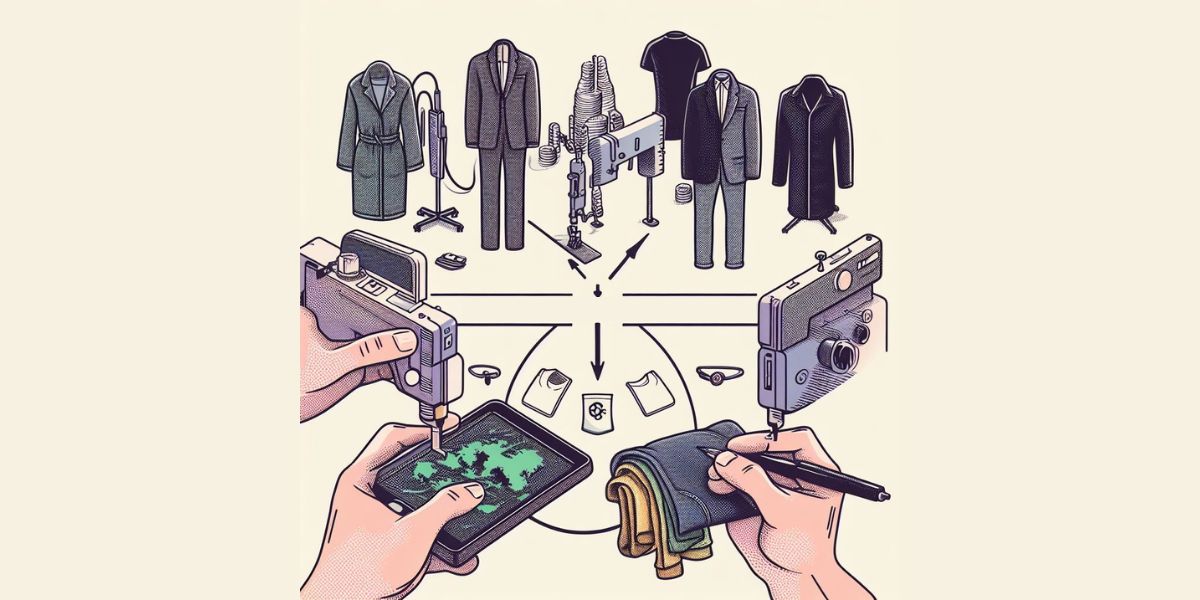Mass production vs. mass customization
published on
In the fashion industry, the goal of players is to satisfy consumer needs by offering products that reflect consumer tastes and current trends. Two different approaches to achieving this goal are “mass customization” and “mass production.” These differ significantly from each other in terms of the production process, the level of customization they offer, and how they respond to consumers. Read on to find out more!
Mass production
Mass production has deep-rooted origins within the fashion industry, serving as a cornerstone of the manufacturing process. This methodology hinges on the creation of vast quantities of standardized fashion items, which are duplicated and disseminated on a grand scale. It represents a highly efficient approach in terms of both cost and time, enabling companies to swiftly and economically fulfill market demand.
The hallmark of mass production lies in the large volumes of products it generates, facilitated by the implementation of highly automated industrial processes that bring about optimized production and reduced operational expenses.
The concept of uniformity
At the heart of mass production in fashion is the concept of uniformity. The core idea is to streamline the manufacturing process by standardizing the design, materials, and assembly methods of a particular fashion item. This standardization facilitates the creation of identical or near-identical products in large quantities.

In the context of clothing, for instance, it means that a particular style, such as a basic white t-shirt, is produced in such a way that each unit is virtually indistinguishable from the next. This level of consistency is pivotal to the success of mass production, as it ensures that consumers receive a reliable and predictable product.
The sheer scale of mass production operations is remarkable. Fashion companies often invest in state-of-the-art machinery and automation technologies to maximize output. Automated sewing machines, fabric cutters, and assembly line processes are employed to expedite production.
Mass production and technology
These technologies not only enhance the speed of production but also reduce the margin for human error, resulting in higher-quality products.
Furthermore, mass production grants fashion companies significant cost advantages. Economies of scale come into play, as the larger the volume of production, the lower the cost per unit. Bulk purchasing of raw materials, streamlined logistics, and optimized energy consumption all contribute to cost savings. This, in turn, allows fashion brands to offer products at competitive prices while maintaining healthy profit margins.
Time efficiency is another hallmark of mass production. With standardized processes and large-scale machinery in place, the lead time from the initial design concept to the final product hitting the shelves is drastically reduced. This agility is crucial in the fashion industry, where trends can shift rapidly, and companies need to adapt quickly to changing consumer preferences.

In conclusion, mass production has firmly established itself as a fundamental approach in fashion, underpinned by the creation of standardized, high-volume products. Its efficiency in terms of cost, time, and quality makes it a key driver of success for fashion companies seeking to meet market demand swiftly and economically.
By leveraging advanced automation and economies of scale, mass production ensures that consumers can enjoy affordable, consistent, and on-trend fashion items.
Mass production in a nutshell
With mass production, products tend to be standardized, lack customization and have no differentiating elements. This can be very important to customers. In addition, mass production carries the risk of excess inventory and wasted resources. This, in fact, can happen frequently, with a negative impact in terms of sustainability, since unsold products remain as stock. Moreover, by prioritizing quantity and efficiency, mass production is an approach that struggles to adapt to changes in consumer preferences and new fashion trends.
Mass customization
Mass customization stands in stark contrast to the conventional uniformity offered by mass production, emerging as a response to the desire for more individualized and diverse products. This innovative approach effectively marries the advantages of mass production with the customization of products to cater to the unique preferences and needs of discerning consumers. It empowers customers to actively engage in the design and personalization of their products, enabling them to select from a rich array of options, encompassing style, size, color, and material choices. This level of customer participation instills a profound sense of involvement and satisfaction, as the final product is a reflection of the customer’s distinctive taste and personality.
In the realm of mass customization, the customer becomes an integral part of the creative process. They are no longer mere passive recipients of pre-made fashion items, but rather co-creators of their attire. This dynamic interaction engenders a profound connection between the customer and the brand, fostering loyalty and a more profound sense of ownership over their clothing choices.
Mass customization and technology
Mass customization has gained considerable traction in recent years, largely attributable to the widespread adoption of digital technologies. Online fashion stores and e-commerce platforms have become powerful tools for enabling customers to personalize their garments with just a few clicks.
The spirit of innovation and creativity inherent in these platforms has redefined the shopping experience, allowing customers to actively participate in the design process. They can experiment with different combinations, visualize the final product, and make choices that resonate with their unique style and tastes.
This transformative shift towards mass customization also holds great promise for sustainability. Unlike mass production, where excess inventory and waste are common, mass customization significantly reduces waste.
Products are produced only when they are ordered, minimizing overproduction and reducing the environmental impact of fashion manufacturing. This alignment with sustainable practices is increasingly important in the modern fashion industry, where eco-conscious consumers are demanding responsible and ethical production processes.

Mass customization in a nutshell
In conclusion, mass customization has emerged as a compelling alternative to the traditional approach of mass production. It empowers consumers to actively shape and personalize their fashion items, fostering a sense of engagement and satisfaction.
Enabled by digital technologies, this approach not only enhances the customer experience but also holds the potential to minimize waste, making it a sustainable choice for both brands and consumers in the fashion industry.
Mass customization vs. mass production
Both mass customization and mass production offer distinct advantages and drawbacks, and as of late, the market is decidedly veering towards a stronger preference for customization.
This shift is chiefly propelled by evolving consumer expectations; individuals today are progressively seeking fashion items that resonate with their distinct identities, preferences, and personalities. In response to this demand for uniqueness, mass customization has emerged as an effective and promising solution.
Mass production has long been the cornerstone of the fashion industry, celebrated for its efficiency in producing standardized products at scale.
While it is a cost-effective and time-efficient method, it often sacrifices individuality, resulting in a sea of identical products that may not fully align with the diverse tastes and preferences of consumers. This can lead to a sense of homogeneity in the market, where consumers have limited choices that reflect their individuality.
Conversely, mass customization grants consumers the power to actively participate in the creation of their fashion items, whether it be clothing, accessories, or footwear. This personal involvement allows individuals to choose from a myriad of options, tailoring their products to meet their specific needs and style. It fosters a sense of ownership and satisfaction, as customers can be assured that the final product is an embodiment of their unique taste and personality.
A constantly increasing demand for customization
In recent years, digital technologies and e-commerce platforms have further fueled the demand for customization. These platforms empower customers to effortlessly personalize their fashion choices, offering a highly interactive and user-friendly experience.
They can experiment with various design elements, from fabric selection to size and color, creating products that genuinely resonate with their tastes and lifestyle. This level of engagement and self-expression has redefined the shopping experience, making it more fulfilling and enjoyable.
Moreover, mass customization aligns with the broader push towards sustainability in the fashion industry.
By producing garments only when they are ordered, it significantly reduces waste compared to mass production, which often generates excess inventory. This environmentally responsible approach is becoming increasingly important to consumers who are conscious of the ecological impact of their fashion choices.
In conclusion, the fashion market is undeniably gravitating towards customization as consumers increasingly demand unique and personalized products that mirror their individual identities.
Mass customization is ideally suited to fulfill this need, empowering customers to actively engage in the design process and creating a more satisfying and sustainable fashion experience. It represents a pivotal shift in the industry, where individuality and personalization are becoming key drivers of success.
